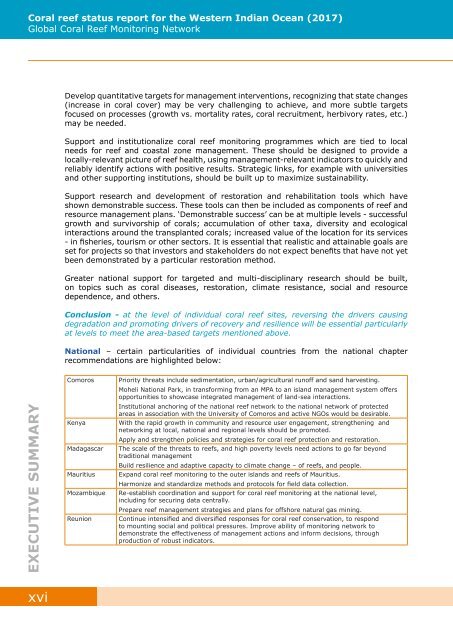GCRMN_COI_2017-Western Indian Ocean Reef Status
GCRMN Western Indian Ocean Coral Reef Status report for 2017. Produced by the Indian Ocean Commission and CORDIO East Africa
GCRMN Western Indian Ocean Coral Reef Status report for 2017. Produced by the Indian Ocean Commission and CORDIO East Africa
Create successful ePaper yourself
Turn your PDF publications into a flip-book with our unique Google optimized e-Paper software.
Coral reef status report for the <strong>Western</strong> <strong>Indian</strong> <strong>Ocean</strong> (<strong>2017</strong>)<br />
Global Coral <strong>Reef</strong> Monitoring Network<br />
Develop quantitative targets for management interventions, recognizing that state changes<br />
(increase in coral cover) may be very challenging to achieve, and more subtle targets<br />
focused on processes (growth vs. mortality rates, coral recruitment, herbivory rates, etc.)<br />
may be needed.<br />
Support and institutionalize coral reef monitoring programmes which are tied to local<br />
needs for reef and coastal zone management. These should be designed to provide a<br />
locally-relevant picture of reef health, using management-relevant indicators to quickly and<br />
reliably identify actions with positive results. Strategic links, for example with universities<br />
and other supporting institutions, should be built up to maximize sustainability.<br />
Support research and development of restoration and rehabilitation tools which have<br />
shown demonstrable success. These tools can then be included as components of reef and<br />
resource management plans. ‘Demonstrable success’ can be at multiple levels - successful<br />
growth and survivorship of corals; accumulation of other taxa, diversity and ecological<br />
interactions around the transplanted corals; increased value of the location for its services<br />
- in fisheries, tourism or other sectors. It is essential that realistic and attainable goals are<br />
set for projects so that investors and stakeholders do not expect benefits that have not yet<br />
been demonstrated by a particular restoration method.<br />
Greater national support for targeted and multi-disciplinary research should be built,<br />
on topics such as coral diseases, restoration, climate resistance, social and resource<br />
dependence, and others.<br />
Conclusion - at the level of individual coral reef sites, reversing the drivers causing<br />
degradation and promoting drivers of recovery and resilience will be essential particularly<br />
at levels to meet the area-based targets mentioned above.<br />
National – certain particularities of individual countries from the national chapter<br />
recommendations are highlighted below:<br />
EXECUTIVE SUMMARY<br />
Comoros<br />
Kenya<br />
Madagascar<br />
Mauritius<br />
Mozambique<br />
Reunion<br />
Priority threats include sedimentation, urban/agricultural runoff and sand harvesting.<br />
Moheli National Park, in transforming from an MPA to an island management system offers<br />
opportunities to showcase integrated management of land-sea interactions.<br />
Institutional anchoring of the national reef network to the national network of protected<br />
areas in association with the University of Comoros and active NGOs would be desirable.<br />
With the rapid growth in community and resource user engagement, strengthening and<br />
networking at local, national and regional levels should be promoted.<br />
Apply and strengthen policies and strategies for coral reef protection and restoration.<br />
The scale of the threats to reefs, and high poverty levels need actions to go far beyond<br />
traditional management<br />
Build resilience and adaptive capacity to climate change – of reefs, and people.<br />
Expand coral reef monitoring to the outer islands and reefs of Mauritius.<br />
Harmonize and standardize methods and protocols for field data collection.<br />
Re-establish coordination and support for coral reef monitoring at the national level,<br />
including for securing data centrally.<br />
Prepare reef management strategies and plans for offshore natural gas mining.<br />
Continue intensified and diversified responses for coral reef conservation, to respond<br />
to mounting social and political pressures. Improve ability of monitoring network to<br />
demonstrate the effectiveness of management actions and inform decisions, through<br />
production of robust indicators.<br />
xvi


















